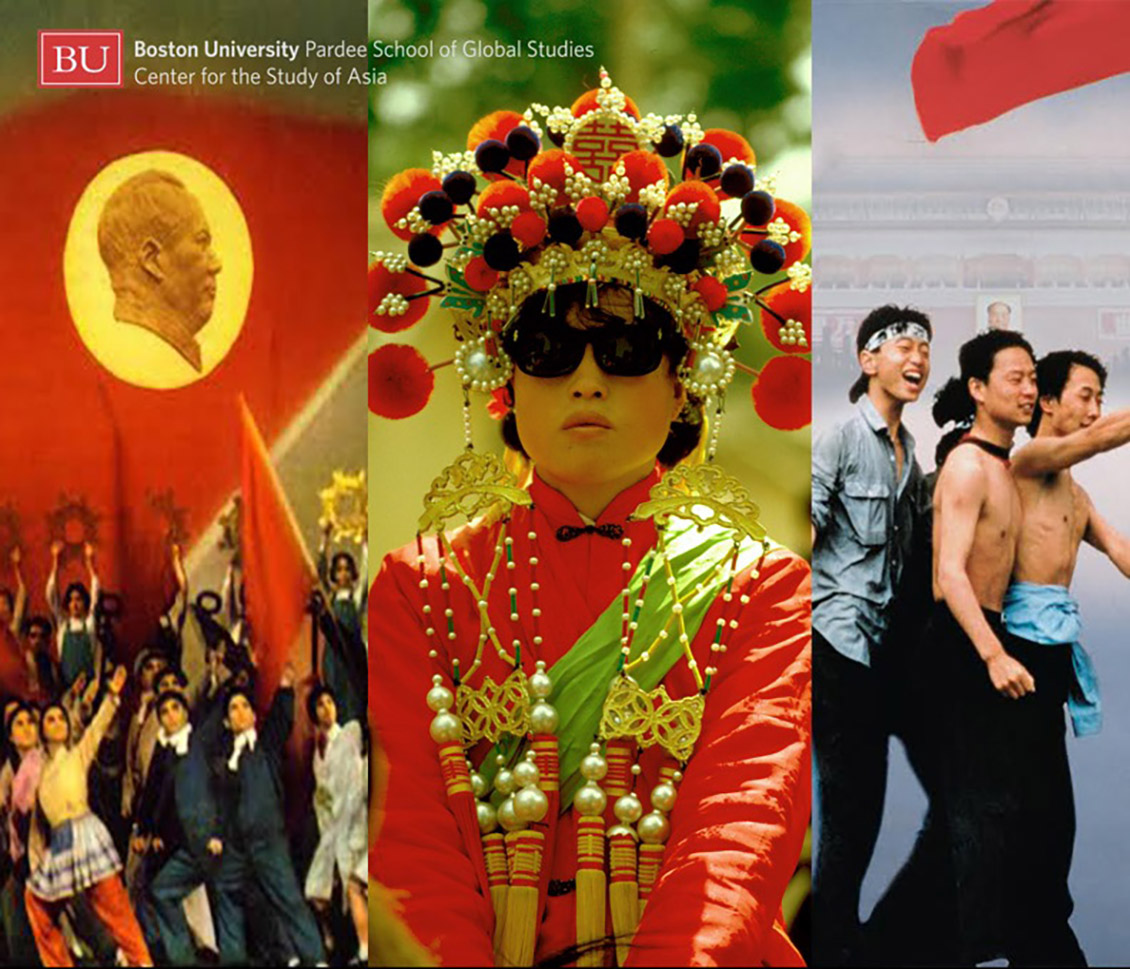History in Images, History in Words: In Search of Facts in Documentary Filmmaking
History in Images, History in Words:
In Search of Facts
in Documentary Filmmaking
A lecture by Carma Hinton
Robinson Professor of Visual Culture and Chinese Studies at George Mason University
Monday April 10, 2017 from 4-7 pm
at the Photonics Center (9th fl.), 8 St. Mary’s Street, Boston University
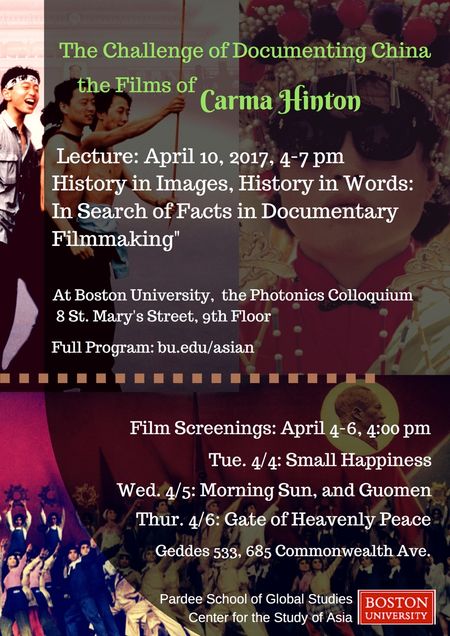 My presentation will focus on the process of documentary filmmaking, especially the many challenges my team and I faced in trying to create engaging filmic narratives that are both factually accurate and encompass multiple perspectives. I will use excerpts from my films as well as out-takes to illustrate the difficulties in determining what information to include and exclude, assess the compromises involved in the choices, and explore the consequences of taking various possible paths. I will also address the different problems that a historian encounters when presenting history in images as opposed to in words: the potential and limitation of each medium and what information each might privilege or obscure. I believe that in this age of “alternative facts” and “parallel universes,” reflections on the challenges in obtaining authenticity and truth and the importance of relentlessly striving to reach this goal, take on particularly urgent meaning.
My presentation will focus on the process of documentary filmmaking, especially the many challenges my team and I faced in trying to create engaging filmic narratives that are both factually accurate and encompass multiple perspectives. I will use excerpts from my films as well as out-takes to illustrate the difficulties in determining what information to include and exclude, assess the compromises involved in the choices, and explore the consequences of taking various possible paths. I will also address the different problems that a historian encounters when presenting history in images as opposed to in words: the potential and limitation of each medium and what information each might privilege or obscure. I believe that in this age of “alternative facts” and “parallel universes,” reflections on the challenges in obtaining authenticity and truth and the importance of relentlessly striving to reach this goal, take on particularly urgent meaning.
About the speaker:
Carma Hinton is an art historian and a filmmaker. She received her Ph.D. in Art History from Harvard University and is now Robinson Professor of Visual Culture and Chinese Studies at George Mason University. Together with Richard Gordon, Hinton has directed many documentary films, including Small Happiness, All Under Heaven, To Taste a Hundred Herbs, Abode of Illusion: The Life and Art of Chang Dai-chien, The Gate of Heavenly Peace, and Morning Sun. She has won two Peabody Awards, the American Historical Association’s John E. O’Connor Film Award, the International Critics Prize and the Best Social and Political Documentary at the Banff Television Festival, and a National News & Documentary Emmy, among others. Hinton is currently working on a book about Chinese scrolls depicting the theme of demon quelling. Carma Hinton was born in Beijing. Chinese is her first language and culture.

Network Research in Chinese Studies, online conference (23-24 and 30-31 July 2021)
The China Historical Christian Database (CHCD) Project will be one of a number of projects to be presented and discussed at the online international conference, Historical Network Research in Chinese Studies, to be held via Zoom on 23-24 July and 30-31 July 2021.
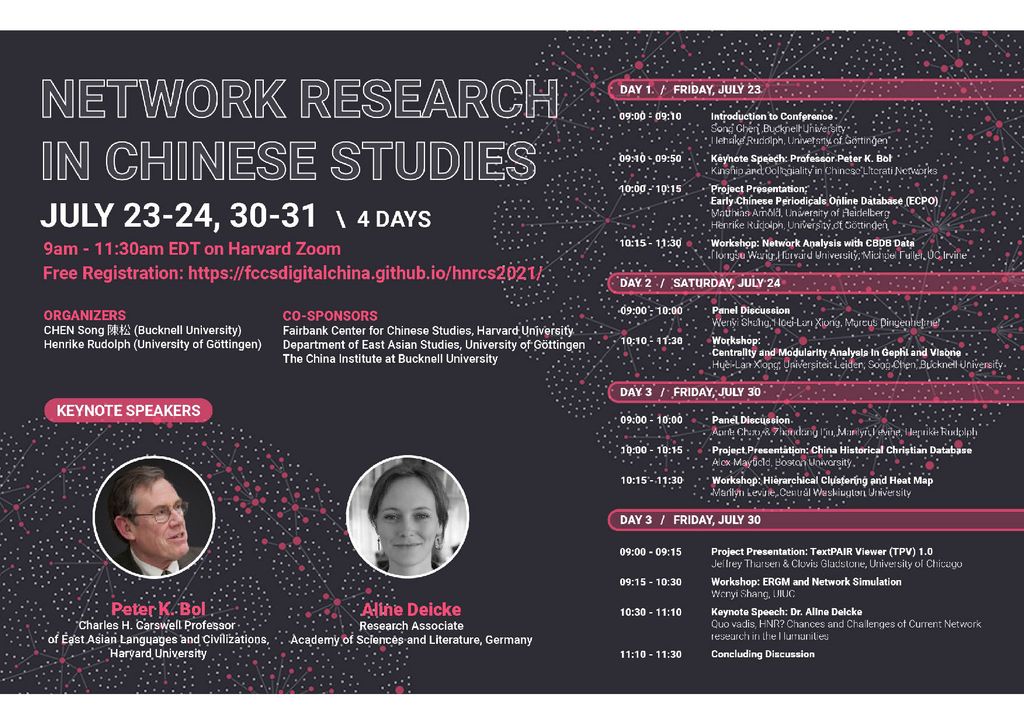
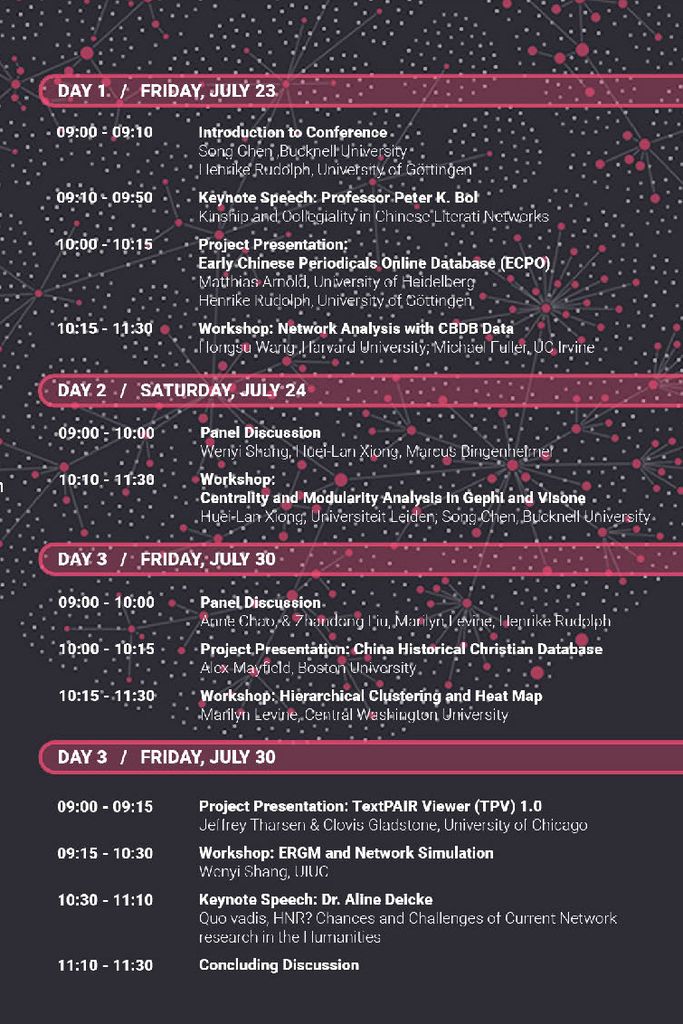
Call for Doctoral Fellow proposals, Global Decolonization Initiative (deadline July 30, 2021)

Japan Society of Boston event, Recovering from Disaster: Resilience and the Importance of Social Networks in Tohoku, Northeast Japan (Tuesday, May 25, 2021)
The Japan Society of Boston is hosting an online Zoom event "Recovering from Disaster: Resilience and the Importance of Social Networks in Tohoku (Northeast Japan)" on Tuesday, May 25, 2021 from 6:00 to 7:00 pm ET.
The discussion will feature Daniel Aldrich (Professor of political science and Director of the Security and Resilience Studies Program at Northeastern University), Mio Yamamoto (Executive Director, WIT [World in Tohoku]), and Tsutomu Yamanaka (Program Coordinator at the Fukushima Cooperative Reconstruction Center) to discuss their insights on Tohoku's recovery from the March 2011 disaster and what it has taken to rebuild. Moderating the discussion will be Allentza Michel, Founder and Principal & Creative Director of Powerful Pathways.
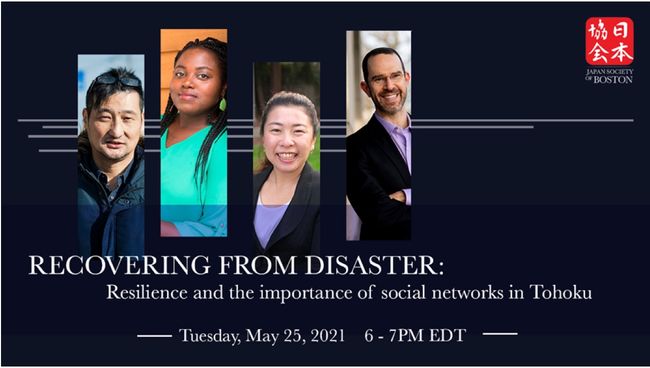
The program is Free, although you can donate to the Japan Society of Boston if you wish. To read more details about this Japan Society event, and to register, click https://www.japansocietyboston.org/event-4302406
Vietnam Studies Symposium: Silences and Reverberations: Studying Historical and Contemporary Vietnam (Friday, May 28, 2021)
“Silences and Reverberations: Studying Historical and Contemporary Vietnam,”
a one-day online symposium, brings together junior and senior scholars, graduate and undergraduate students, and interested members of the public to consider the study of historical and contemporary Vietnam from a range of disciplinary perspectives. Structured around opening and closing keynote addresses and three 75-minute thematic roundtable discussions, panels will collectively lay out the scope of Vietnamese Studies and explore possible future directions. Speakers from across North America, Europe, and Vietnam, with specializations in anthropology, history, Asian languages and cultures, geography, political philosophy, and sociology will seek to answer questions that showcase the diversity of fields and methodologies that are essential to understanding the richness of Vietnam’s past and present, and its future in a rapidly developing global and local environment.
The symposium has four related goals. First, it is aimed to exchange and develop methodological innovations across multiple disciplines engaged in the study of Vietnam, including area studies, the humanities, and the social sciences. Second, it is designed to promote to the wider academic communities the study and teaching of Vietnam in relation to East, South, and Southeast Asia. Third, it is designed to help emerging scholars expand and deepen their connections with other Vietnam Studies scholars. Finally, it is designed to initiate comparative discussions with other East, South, and Southeast Asia specialists, who will help moderate the panels.
Friday, May 28, 2021, from 10:30 am-6:00 pm EST
Location: Online; Register here
For a detailed description of the symposium schedule and speakers, click here https://sites.bu.edu/vnsympos/
Organizers:
Merav Shohet
Assistant Professor, Department of Anthropology
Boston University
Dat M. Nguyen
Postdoctoral Researcher
NIOD Institute for War, Holocaust and Genocide Studies
Royal Netherlands Academy of Arts and Sciences (KNAW)
For inquiries, please contact the organizers at: vnsympos@bu.edu
This symposium is sponsored by:
Boston University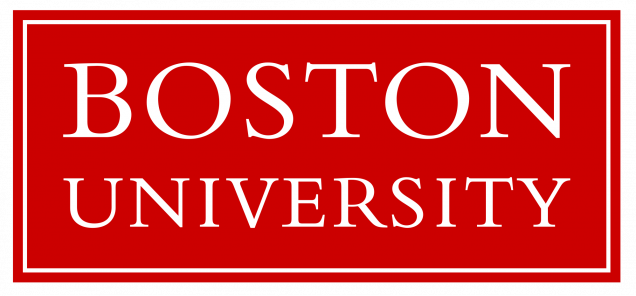
Institute on Culture, Religion and World Affairs (CURA)
Center for the Humanities (BUCH)
The Frederick S. Pardee Center for the Study of the Longer-Range Future
Association for Asian Studies
Vietnam Studies Group, Sub-Committee of the Southeast Asia Council
Chaya Bhuvaneswar (BUCSA Affiliated Fellow) publishes guest essay in the New York Times
"As a Doctor, I’ve Worked Tirelessly Through the Pandemic. That Hasn’t Stopped the Hate"
Read the full essay by Dr. Chaya Bhuvaneswar in the New York Times, May 24, 2021
New book by April Hughes (REL), Worldly Saviors and Imperial Authority in Medieval Chinese Buddhism
We are pleased to draw your attention to Prof. April Hughes' new book, Worldly Saviors and Imperial Authority in Medieval Chinese Buddhism, published this month by the University of Hawaii Press. Congratulations April!
About the Book: (from the publisher)
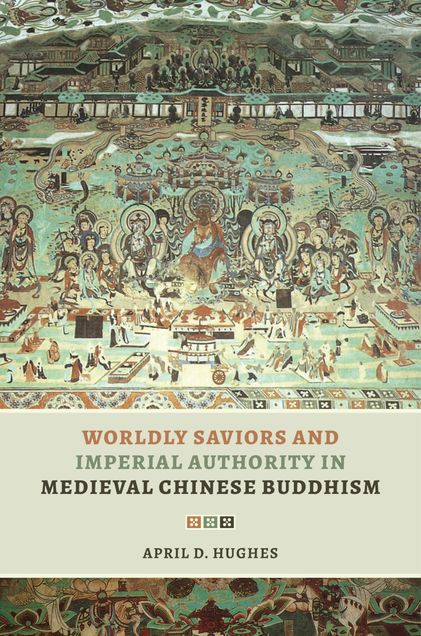 Although scholars have long assumed that early Chinese political authority was rooted in Confucianism, rulership in the medieval period was not bound by a single dominant tradition. To acquire power, emperors deployed objects and figures derived from a range of traditions imbued with religious and political significance. Author April D. Hughes demonstrates how dynastic founders like Wu Zhao (Wu Zetian, r. 690–705), the only woman to rule China under her own name, and Yang Jian (Emperor Wen, r. 581–604), the first ruler of the Sui dynasty, closely identified with Buddhist worldly saviors and Wheel-Turning Kings to legitimate their rule. During periods of upheaval caused by the decline of the Dharma, worldly saviors arrived on earth to quell chaos and to rule and liberate their subjects simultaneously. By incorporating these figures into the imperial system, sovereigns were able to depict themselves both as monarchs and as Buddhas or Bodhisattvas in uncertain times.
Although scholars have long assumed that early Chinese political authority was rooted in Confucianism, rulership in the medieval period was not bound by a single dominant tradition. To acquire power, emperors deployed objects and figures derived from a range of traditions imbued with religious and political significance. Author April D. Hughes demonstrates how dynastic founders like Wu Zhao (Wu Zetian, r. 690–705), the only woman to rule China under her own name, and Yang Jian (Emperor Wen, r. 581–604), the first ruler of the Sui dynasty, closely identified with Buddhist worldly saviors and Wheel-Turning Kings to legitimate their rule. During periods of upheaval caused by the decline of the Dharma, worldly saviors arrived on earth to quell chaos and to rule and liberate their subjects simultaneously. By incorporating these figures into the imperial system, sovereigns were able to depict themselves both as monarchs and as Buddhas or Bodhisattvas in uncertain times.
In this inventive and original work, Hughes traces worldly saviors—in particular Maitreya Buddha and Prince Moonlight—as they appeared in apocalyptic scriptures from Dunhuang, claims to the throne made by various rebel leaders, and textual interpretations and assertions by Yang Jian and Wu Zhao. Yang Jian associated himself with Prince Moonlight and took on the persona of a Wheel-Turning King whose offerings to the Buddha were not flowers and incense but weapons of war to reunite a long-fragmented empire and revitalize the Dharma. Wu Zhao was associated with several different worldly savior figures. In addition, she saw herself as the incarnation of a Wheel-Turning King for whom it was said the Seven Treasures manifested as material representations of his right to rule. Wu Zhao duly had the Seven Treasures created and put on display whenever she held audiences at court.
The worldly savior figure allowed rulers to inhabit the highest role in the religious realm along with the supreme role in the political sphere. This incorporation transformed notions of Chinese imperial sovereignty, and associating rulers with a Buddha or Bodhisattva continued long after the close of the medieval period.
About the Author:
April D. Hughes received her Ph.D. in Religion fromPrinceton University in 2014.
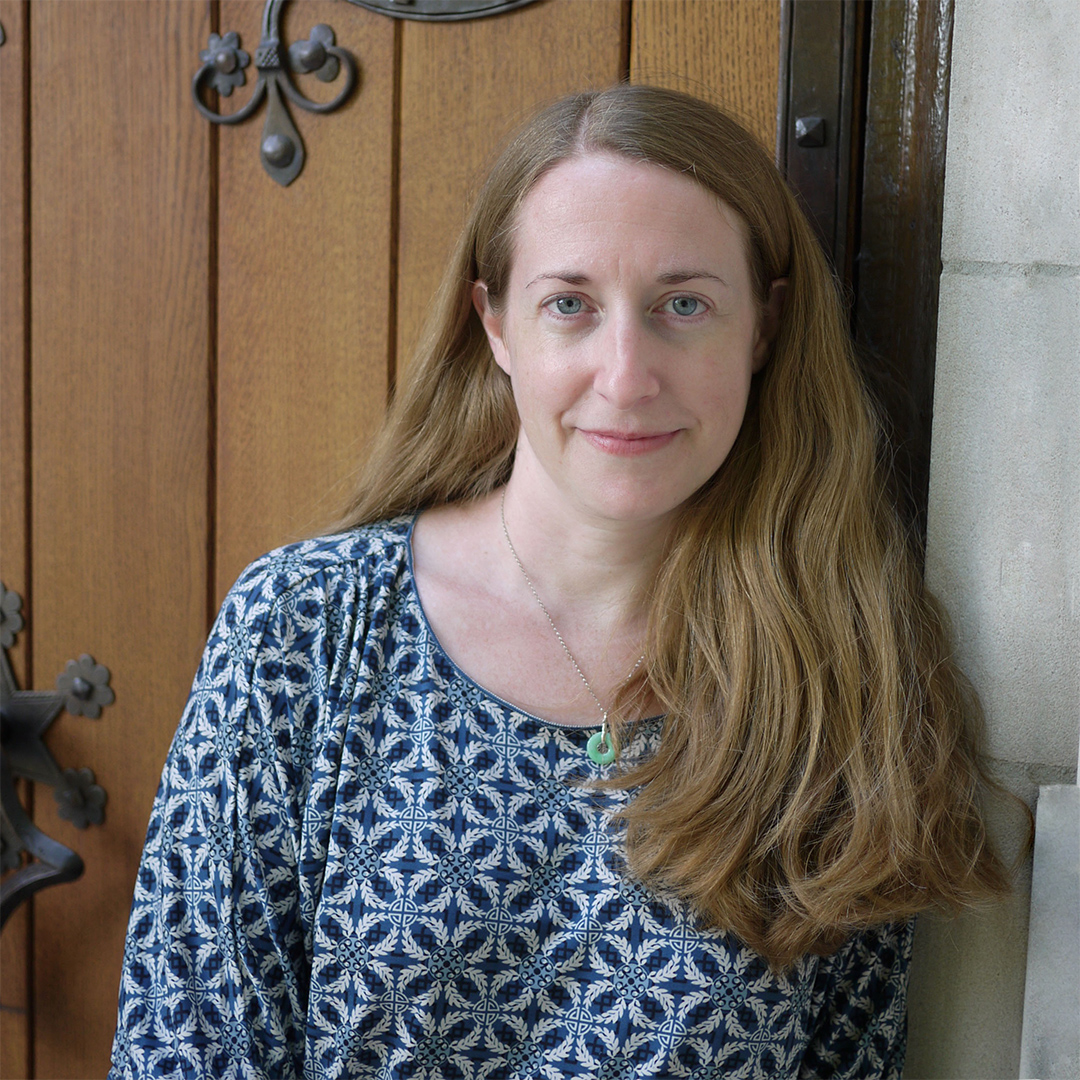 She completed M.A. degrees in East Asian Studies at the University of California, Berkeley and the University of California, Los Angeles. Her research situates medieval Chinese religion within broader cultural and social contexts. She is especially interested in medieval Chinese Buddhist manuscripts and mural paintings discovered at Dunhuang (northwest China). Her current book project is entitled “Personifying the Buddha: Politics, Gender, and Religion in Medieval China.” Over and against the assumption that political authority was argued chiefly in Confucian terms, the book investigates the different symbol systems (Confucian, Buddhist, and Daoist) that emperors employed to validate their reigns. Specifically, the book highlights the centrality of Buddhism to Chinese notions of kingship, since both emperors and rebels sometimes solidified claims to the imperial throne by declaring themselves Buddhas incarnate, descended to earth in order to rule and revive Buddhist Teachings.
She completed M.A. degrees in East Asian Studies at the University of California, Berkeley and the University of California, Los Angeles. Her research situates medieval Chinese religion within broader cultural and social contexts. She is especially interested in medieval Chinese Buddhist manuscripts and mural paintings discovered at Dunhuang (northwest China). Her current book project is entitled “Personifying the Buddha: Politics, Gender, and Religion in Medieval China.” Over and against the assumption that political authority was argued chiefly in Confucian terms, the book investigates the different symbol systems (Confucian, Buddhist, and Daoist) that emperors employed to validate their reigns. Specifically, the book highlights the centrality of Buddhism to Chinese notions of kingship, since both emperors and rebels sometimes solidified claims to the imperial throne by declaring themselves Buddhas incarnate, descended to earth in order to rule and revive Buddhist Teachings.
"The importance of apocalyptic thought in medieval China has long been downplayed in Anglophone scholarship, so it is a great pleasure to have at last a book based firmly on the key surviving sources to redress this imbalance. April Hughes’ work is the first study to pull all of the materials together and put them and the political regimes and rebel movements that took cognizance of such beliefs in a helpful chronological sequence. It is original, sound, and important."
—T. H. Barrett, SOAS, University of London
Worldly Saviors and Imperial Authority in Medieval Chinese Buddhism
Congratulations to our newly-tenured faculty in Asian Studies!
We are delighted to pass along news (May 18, 2021) from Provost Jean Morrison that the following faculty members who work on Asia have been awarded tenure and promotion:
Lei Guo, COM, Emerging Media Studies, explores the development of media effects theories, 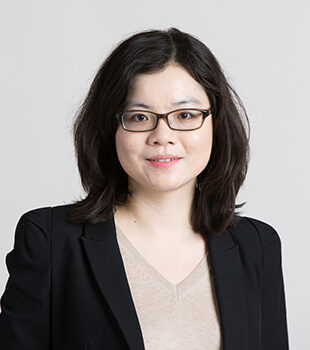 computational social science methodologies, and emerging media and democracy in the United States and China. A founding member of the Faculty of Computing & Data Sciences, she is a past recipient of the Google Research Award and the Journalism & Mass Communication Quarterly Outstanding Article Award and was BU’s inaugural East Asia Studies Career Development Professor. Her current work examines the impact of international news coverage of COVID-19, and she is co-PI on a large-scale NSF grant developing tools for analyzing US news in over 100 languages. She has published eight book chapters, one edited book, and over 30 journal articles. She has been promoted to Associate Professor, with tenure.
computational social science methodologies, and emerging media and democracy in the United States and China. A founding member of the Faculty of Computing & Data Sciences, she is a past recipient of the Google Research Award and the Journalism & Mass Communication Quarterly Outstanding Article Award and was BU’s inaugural East Asia Studies Career Development Professor. Her current work examines the impact of international news coverage of COVID-19, and she is co-PI on a large-scale NSF grant developing tools for analyzing US news in over 100 languages. She has published eight book chapters, one edited book, and over 30 journal articles. She has been promoted to Associate Professor, with tenure.
Joseph Harris, CAS, Sociology, conducts comparative historical research at the intersection of 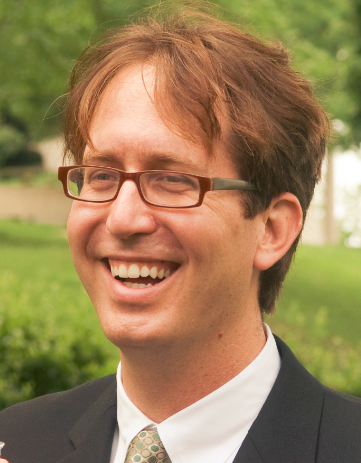 sociology, political science, and global health, working to help resolve problems relevant to global and transnational sociology, medical sociology, the sociology of development, and the sociology of human rights. He is co-founder of the American Sociological Association’s Global Health and Development Interest Group and is a past Fulbright Fellow and recipient of his college’s Gitner Award for Distinguished Teaching. He has authored a book, 2017’s Achieving Access: Professional Movements and the Politics of Health Universalism, as well as a book chapter, and published articles and essays in premier medical and academic journals, including The Lancet. He has been promoted to Associate Professor, with tenure.
sociology, political science, and global health, working to help resolve problems relevant to global and transnational sociology, medical sociology, the sociology of development, and the sociology of human rights. He is co-founder of the American Sociological Association’s Global Health and Development Interest Group and is a past Fulbright Fellow and recipient of his college’s Gitner Award for Distinguished Teaching. He has authored a book, 2017’s Achieving Access: Professional Movements and the Politics of Health Universalism, as well as a book chapter, and published articles and essays in premier medical and academic journals, including The Lancet. He has been promoted to Associate Professor, with tenure.
Ayşe Parla, CAS, Anthropology, is a sociocultural anthropologist whose work focuses on issues of  migration, citizenship, hope, and precarity among ethnic minorities in Turkey. A past fellow and visiting scholar at the Institute for Advanced Study, she has authored an acclaimed book, Precarious Hope: Migration and the Limits of Belonging in Turkey (2019), along with three book chapters, nine encyclopedia entries, and a dozen articles in top peer-reviewed journals, including History and Anthropology. Her current research looks at the post-genocide dispossession of Armenians in Turkey. She has been promoted to Associate Professor, with tenure.
migration, citizenship, hope, and precarity among ethnic minorities in Turkey. A past fellow and visiting scholar at the Institute for Advanced Study, she has authored an acclaimed book, Precarious Hope: Migration and the Limits of Belonging in Turkey (2019), along with three book chapters, nine encyclopedia entries, and a dozen articles in top peer-reviewed journals, including History and Anthropology. Her current research looks at the post-genocide dispossession of Armenians in Turkey. She has been promoted to Associate Professor, with tenure.
Benjamin Siegel, CAS, History, explores the role of South Asia as the center of global economic, 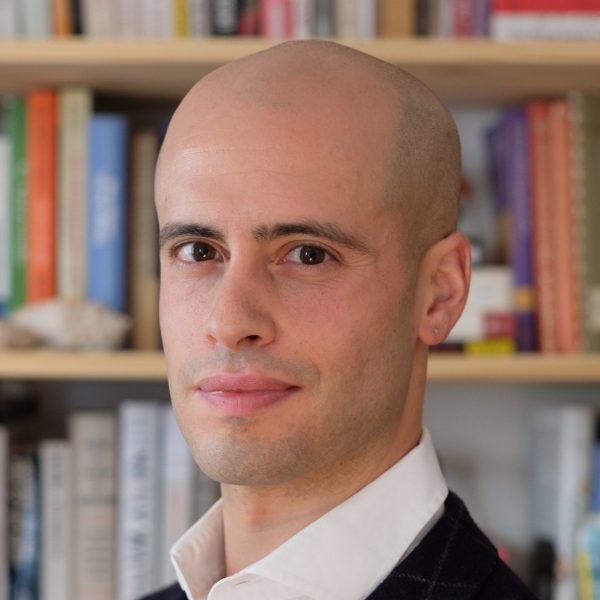 environmental, and political transformations, with special focus on Indian culture, history, and influence. He has published a book, Hungry Nation: Food, Famine, and the Making of Modern India (2018), along with three book chapters and numerous articles in leading US and Indian historical journals and media outlets. His current research explores the transnational history of America’s opioid crisis and is the subject of a forthcoming book. His work has been supported through grants from the American Council of Learned Societies and the American Institution of Indian Studies, and he is a past recipient of his college’s Wisneski Award for Excellence in Teaching. He has been promoted to Associate Professor, with tenure.
environmental, and political transformations, with special focus on Indian culture, history, and influence. He has published a book, Hungry Nation: Food, Famine, and the Making of Modern India (2018), along with three book chapters and numerous articles in leading US and Indian historical journals and media outlets. His current research explores the transnational history of America’s opioid crisis and is the subject of a forthcoming book. His work has been supported through grants from the American Council of Learned Societies and the American Institution of Indian Studies, and he is a past recipient of his college’s Wisneski Award for Excellence in Teaching. He has been promoted to Associate Professor, with tenure.
[The descriptive text comes from Provost Morrison's 5/18/21 email to faculty]
Congratulations to Anne Feng (HAA) for her Henry Luce Foundation/ACLS Program in China Studies Early Career Fellowship
The BU Asian Studies community extends its enthusiastic congratulations to our colleague Anne Feng (Assistant Professor of Chinese Art, Boston University Dept. of the History of Art and Architecture) on being awarded a Henry Luce Foundation/ACLS Program in China Studies Early Career Fellowship for 2021-2022.
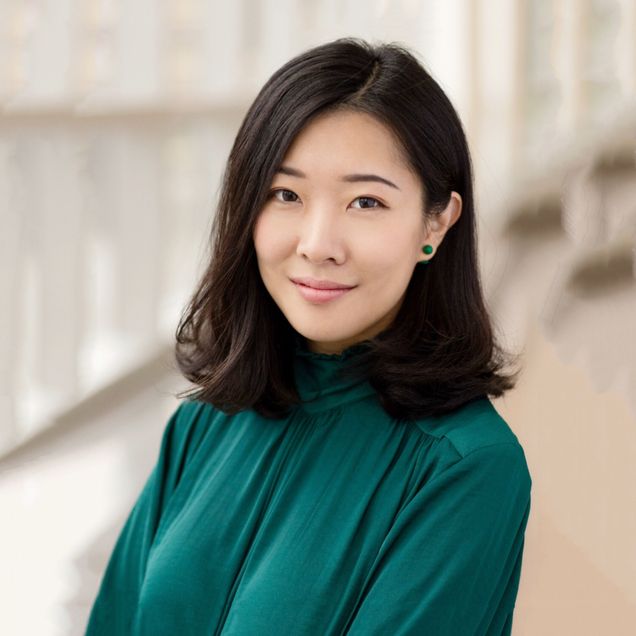 Project details:
Project details:
Aqueous Visions: Water, Meditation, and Mural Painting in Medieval China (618-907 CE)
Despite being situated in arid environments, Buddhist caves around the Taklamakan desert were constructed along complex waterways. This study examines the relationship between visions of Buddhist paradise and water management in medieval China and Central Asia. Representations of Amitabha Buddha’s Pure Land were famous for their expansive aerial views of a water-bound palace. Centered on the Dunhuang caves in northwest China, this project traces the development of a new type of representational space defined by convergent perspective in Chinese art, one that emerged from evolving attitudes towards hydro-engineering, aqueous materiality, and transparency in the Tang empire. Aqueous Visions traces the efforts of medieval painters to use the qualities of water to reimagine space and vision.
Laura Brubaker-Wittman (PhD candidate, BU Anthropology) wins Fulbright Scholarship to Indonesia
Congratulations to Laura Brubaker-Wittman, a PhD student in BU's Biological Anthropology program, who has been awarded a Fulbright Scholarship to Indonesia to continue her dissertation research “Interacting with Orangutans: A Multispecies Ethnography of Relationship Building in Borneo.”
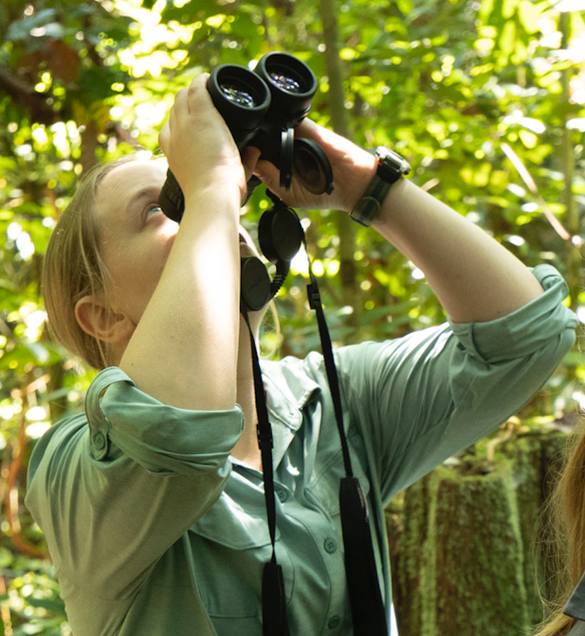 Laura holds a Master’s degree in Sustainable Development and Policy Advocacy from the School for International Training and a Bachelor’s degree in Anthropology from the University of Colorado. Her doctoral research focuses on the human-nonhuman primate interface by using the mixed methodology of ethnoprimatology, incorporating theories and techniques from both cultural and biological anthropology. Specifically, her work asks questions about how orangutans and humans interact and co-exist in landscapes that have been shaped by human disturbance and what this means for orangutan health and behavior. Ultimately, she hopes her work can bring together science, conservation, and environmental justice to help protect orangutans and support local communities at the same time. Laura's primary advisor is Prof. Cheryl Knott (Depts. of Anthropology and Biology, and Women's, Gender and Sexuality Studies Program, BU)
Laura holds a Master’s degree in Sustainable Development and Policy Advocacy from the School for International Training and a Bachelor’s degree in Anthropology from the University of Colorado. Her doctoral research focuses on the human-nonhuman primate interface by using the mixed methodology of ethnoprimatology, incorporating theories and techniques from both cultural and biological anthropology. Specifically, her work asks questions about how orangutans and humans interact and co-exist in landscapes that have been shaped by human disturbance and what this means for orangutan health and behavior. Ultimately, she hopes her work can bring together science, conservation, and environmental justice to help protect orangutans and support local communities at the same time. Laura's primary advisor is Prof. Cheryl Knott (Depts. of Anthropology and Biology, and Women's, Gender and Sexuality Studies Program, BU)
[These details come from http://www.bu.edu/bufellow/laura-brubaker-wittman/]
Peoples of the Pacific: Rodgers and Hammerstein musical and a Covarrubias anthropological map, portrayals of ethnic diversity raise questions about images and stereotypes
Connie C. Chin, President of the Norman B. Leventhal Map and Education Center at the Boston Public Library explores how a Rodgers and Hammerstein musical and a Covarrubias anthropological map provide portrayals of ethnic diversity that raise questions about images and stereotypes.

To read the full article, click here
About the author: Connie Chin was appointed President of The Norman B. Leventhal Map Center at the Boston Public Library in 2016. Previously, she served as Chief Operating Officer of the John F. Kennedy Library Foundation and as General Manager at Jacob’s Pillow Dance Festival. Connie also worked in brand management at Kraft Foods and Ocean Spray. She holds an A.B. from Harvard and M.B.A. from Yale.
